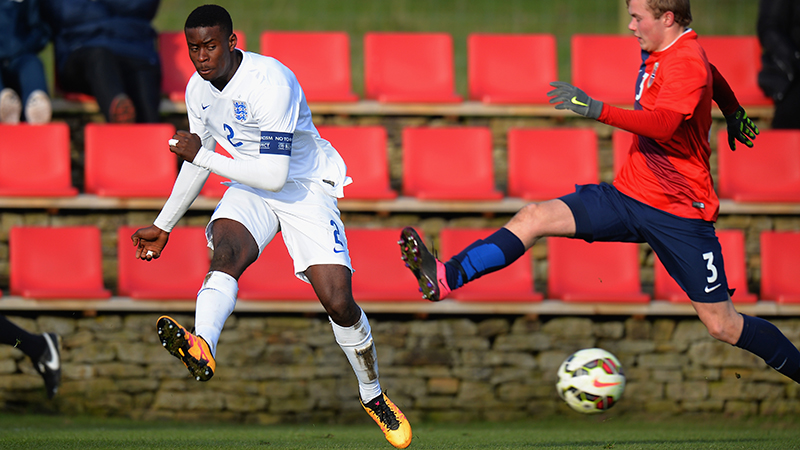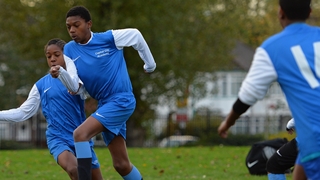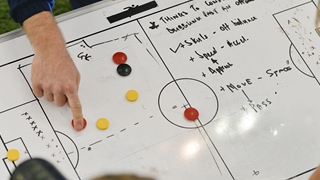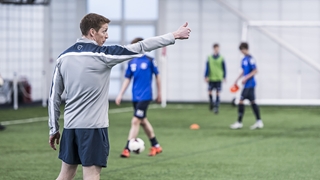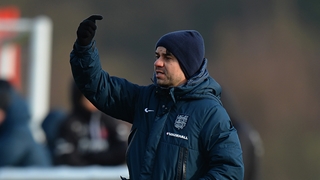
Dan Micciche, England U16 head coach, explains how clear and simple challenges linked to a specific style of play are used in both training and games.
How coaches translate complex footballing ideas into clear and understandable messages for young players is crucial to the coaching process. For England U16 head coach, Dan Micciche, working with “simplicity and clarity” is key.
“Recently we’ve been looking at how we can simplify high-level information so players and staff can remember it quickly and effectively given the small amount of time we have together in international football.
“We might do that by having a number, a letter, or a word that acts as a trigger or reference point for the players,” explains Micciche.
The former head of coaching at MK Dons talks about splitting the pitch into different ‘lanes’ in order to help players to “play on different lines and find pockets of space”.
“Our game plan, which is used in meetings before a game and is up on the wall in the dressing room, has both our formation and the opposition’s on and we will split the pitch into different lanes as visual reference points. It helps the players get an idea of where they might be at certain times in the game,” explains Micciche.
“It’s not a case that one player is always in a particular lane, it doesn’t matter who it is, but it is important to the way we play to occupy the pitch. It’s a way of helping develop positional understanding.
“During the game we might just call a word which triggers the players to think about their positioning” he adds.
The methods are working. Last December England’s U16 squad beat Brazil 2-0 in the Nike International tournament in America. The style of play was the most pleasing aspect for Micciche.
England U16s in action at St. George's Park
“The two goals we scored are everything we want to see in an England team in terms of success. For both goals we ended up with six players in the final third and two full-backs in the front four,” he explains.
“We didn’t practise those particular moves that led to the goals. We have our principles and guidelines then, provided you pick the right players, they’ll take care of the rest.
“The players will play in the moment, see different pictures and improvise, because they have been given the licence to do so,” adds Micciche, who encourages the U16s to ‘play with freedom’.
The team challenges are used during England U16s training sessions to reinforce the ideas.
“In training we will sometimes have the pitch marked out into different lanes just as reference points. I might just wait for the opportunity to stop it and say ‘brilliant, well done, what do you notice about your positioning on the pitch?”
“It’s just something to give them a visual cue to get them to think about their positioning which then allows them to go and express themselves,” adds Micciche.Clear instructions extend to all other aspects of the in and out of possession philosophy with players given objectives to aim for during action.
“We work to a 6-6-6 idea: can you win the ball back within six seconds; can you attack with a minimum of six players and can you get the ball over the half-way line within six passes,” explains Micciche.
“With the last one, if the players are on five passes and they aren’t near the half-way line we’re not going to start shouting ‘kick it long’. It’s just an idea for the players to get in their heads that we want to dominate possession - but we want to do it in the opposition’s half.
“We aim for a minimum of six players attacking the final third because we know that most teams will defend with nine, ten, or eleven players, so if we try and attack with less than six we’re going to need to be damn good,” he adds.
The England U16 group have a number of playing principles including stay on the ball, seek creative solutions and win the ball cleanly, which guide the subsequent individual challenges.
“From the principles, each individual will have picked three areas to work on during a game which link to their individual strengths and the reason they are with England,” explains Micciche.
“We will then use some of this to tweak how we play and set-up in the games. For example if we have a defender who is outstanding at 1v1 defending, we will play a system that creates opportunities for him to defend 1v1.
“We might leave the number 9 and 10 out from defending in their own half meaning there are more 1v1 defending scenarios. It also means our best attacking players are conserving energy for when we have the ball. This is even more important in tournament football given the number of games in a short period of time.”
Consistency of language across both preparation and games is also crucial to the process explains Micciche.
“All our training is based around these ideas. We look for opportunities to praise the players for playing in a particular way and always use the same terminology. We’ll sometimes stop the practice, only for a minute, and say ‘I really like it when you did that – which one of our principles does that link into?’”


